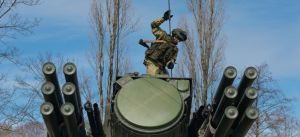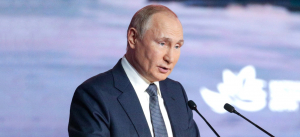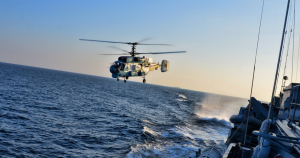
War clouds gather over Ukraine

Russians have been following the course of events in Ukraine with bewilderment. As before, few believe a real war will break out. However, the level of tension is making even the most hardened skeptics nervous. And the role of Western media has become a cause of concern: deliberately or otherwise, many news outlets are seen to be playing the role of willing pawns in a bitter ‘information war’ between the Kremlin and the White House.
What happened last week?
Despite repeated U.S. assertions of an imminent Russian invasion of Ukraine, last week began with signs of de-escalation. President Vladimir Putin and Foreign Minister Sergei Lavrov discussed Monday the possibility of continued talks with their Western counterparts. And then Putin spoke about the end of military exercises with Defense Minister Sergei Shoigu. That news saw the ruble strengthen against the U.S. dollar, and brought some stabilization to stock markets.
But the pendulum swung the other way Tuesday as the Russian parliament voted to ask Putin to recognize the rebel statelets in Eastern Ukraine. If Russia recognizes the People’s Republics of Donetsk (DNR) and the People’s Republic of Luhansk (LNR), then deploying Russian troops to these areas would be a formality and the Minsk Agreements, which brought an end to fighting in 2015, would be dead in the water. However, Putin stated the same day that he was not yet prepared to recognize the republics, and that Russia needs to use “not fully realized opportunities to implement the Minsk Agreement”. A swift recognition of the DNR and LNR is seen as unlikely by experts. But now that parliament has made a formal request, it’s something Putin can return to at any moment.
The Ministry of Defense continued to talk Wednesday about the curtailment of military exercises near the Ukrainian border. A spokesperson said that some units had “already started packing”. Investors lapped this up: the ruble strengthened to under 76 to the U.S. dollar and stock markets — both in Russia and the U.S. — returned to growth.
But hopes that this all added up to a major de-escalation faded quickly. It was clear Wednesday that Russia’s statements about withdrawing troops were being contradicted by Western officials. NATO General Secretary Jens Stoltenberg said Wednesday that Russia was continuing to build up its military presence on the Ukrainian border. And U.S. media outlets published comments by unnamed White House officials Thursday who said that a further 7,000 soldiers had been added to Russia’s 130,000-strong force in the area.

The situation in Eastern Ukraine deteriorated sharply Thursday, with both the Russia-backed rebels and the Ukrainian army accusing the other of intensive artillery bombardments. The same day, the Russian Foreign Ministry expelled the U.S. deputy ambassador in Moscow and gave a formal response to proposed security guarantees from the U.S. – the document contained not a hint of compromise.
The pace of events quickened noticeably Friday: the DNR, and then the LNR, announced a mass evacuation of the population over fears that Ukrainian President Volodymyr Zelensky would soon authorize a military offensive against the rebel statelets. However, the Ukrainian Foreign Ministry categorically denied claims of an impending attack on Donbas — and such a move would amount to political and military suicide considering the Russian troop build-up.
An alleged car bomb exploded in central Donetsk on Friday evening, and U.S. President Joe Biden gave his starkest warning yet of an imminent invasion, saying he was “convinced” that Putin had decided to authorize a military incursion into Ukraine. Separatists leaders in both the LNR and DNR announced Saturday morning that they were conducting a full military mobilization of all adult men. Later in the day, Putin oversaw the beginning of strategic nuclear exercises, including the launch of ballistic missiles.
What do the experts say?
Top foreign policy analyst Fyodor Lukoyanov said that moves by the Russia-backed DNR and LNR were an attempt to force Kyiv to implement the Minsk Agreements. He pointed out that, immediately after the head of the DNR made his statement, Putin called on Ukraine to sit down at the negotiating table with representatives from the DNR and LNR to “coordinate political, military, economic and humanitarian measures to bring an end to the conflict”.
Political analyst Alexei Makarkin agreed. Indeed, he said the gambit was intended to pressure not just Ukraine, but also France and Germany, who, as participants in the Normandy Format for negotiations over the Eastern Ukraine conflict, can influence Kyiv. If there is no sign of progress, Makarkin does not rule out the possibility that Russia will recognize the DNR and LNR, as requested by the Duma earlier this week.
What next?
These events were met with surprise in Russia — and a large degree of skepticism. The White House claims of an imminent invasion late last week forced Russians to contemplate the possibility of a real war, perhaps for the first time. And the tone taken by U.S. officials — and the prospect of a shooting war — were terrifying even for convinced skeptics about military action. However, the Defense Ministry’s announcement about troop withdrawals and Putin’s words on the importance of diplomacy, meant the belief in imminent war quickly faded. Despite the alarming developments later in the week, there are still few in Russia who seriously believe that a large military conflict is just around the corner.

‘Information war’
After last week’s ‘non-invasion’, there was some debate about the role of the Western media in political games between the Kremlin and the White House. Throughout recent Russian history, the ‘Western press’ has been seen as a model of objectivity and impartiality — something worth striving to emulate. However, in recent years the situation has changed. Disillusionment began in 2016 when Russia was accused of helping Donald Trump to become president. In the ensuing media frenzy, news outlets published a lot of expertise on Russia that was often naïve — and sometimes deeply-flawed. Inevitably, Russian propaganda did everything it could to turn a spotlight on this sort of reporting.
Now, it looks like the same thing is happening again. Clearly, the Russian and U.S. governments are waging an information war against each other. And, to some in Russia, it appears as if Western media outlets are taking a far too uncritical approach, not least in clickbait headlines about imminent invasion. There have been claims that Western journalists are — wittingly or unwittingly — exacerbating tensions. All this is a delight for Russian officials, and the Foreign Ministry spent the week mocking the “Bloomberg collective”. The comments on a Facebook post by leading BBC Russian Service journalist Ilya Barabanov reflected some of the disappointment felt by Russia’s liberal media community as they watched the Western coverage of events unfolding in Ukraine.
Why the world should care: Nobody knows what Putin intends to do in Ukraine, and it’s by no means certain his plans will become clearer any time soon. But the Kremlin has already achieved one success: the credibility of independent media outlets have been undermined and clashing media narratives are sowing not only chaos and confusion, but also long-term mistrust.




